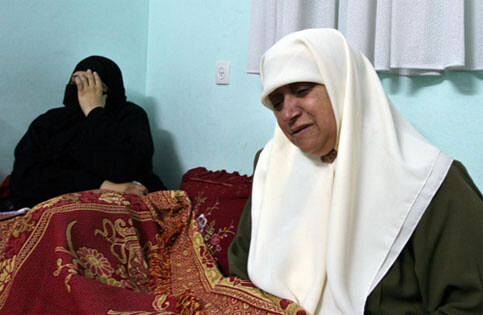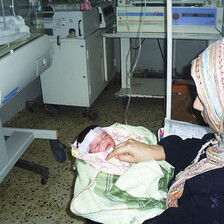The Electronic Intifada 5 December 2007

The mother and another relative of of Na’el al-Kurdi sit in their house after his funeral. (Wissam Nassar/IRIN)
JERUSALEM/GAZA, 5 December (IRIN) - Health officials in the Gaza Strip say they are concerned about hundreds of patients unable to travel to Israel or other countries for vital treatment, and that local hospitals lack essential medical equipment, drugs and fuel.
Only about one in seven patients who used to travel through the Rafah terminal to Egypt for treatment are now able to access medical care in Israel, according to World Health Organization (WHO) statistics.
Since June, when Hamas took over in Gaza, 17 percent of all patients who applied for permits to enter Israel were denied entry, mostly on “security grounds.” In October the figure rose to 23 percent.
“There is a trend that it is getting tougher to get out of Gaza for treatment,” said Mahmoud Daher of the WHO in Gaza.
Following the Hamas takeover, tight Israeli sanctions were placed on all travel to and from the strip, in addition to restrictions on imports and a near total ban on exports.
“The cases of patients waiting for treatment will just get more difficult,” Bassam al-Badri of the referral department at the ministry of health in Gaza, told IRIN. “Some of them will have to have unnecessary amputations. Already some people are in the intensive care unit because they didn’t get treated.”
At least 13 people who completed the permit application process died in the past two months waiting for treatment, according to health organizations. Another 15 or so died while still applying, according to the Gaza ministry of health.
One was Na’el al Kurdi, a cancer patient who died in Gaza in November at the age of 21. Before June he was treated in Egypt, but after that he was unable to access care in Israel, due to “security reasons.”
“I was very sad and worried when he was dying here in our home in front of my eyes, while we could not do anything,” Umm Rami, his mother, told IRIN. “In the last two weeks, he barely drank water.”
According to Physicians for Human Rights-Israel (PHR), the closure of Rafah means that many people suspected of being a security risk are no longer able to access any care. “Our minimum demand is that Israel ensures access for all patients who need treatment outside Gaza,” said Miri Weingarten of PHR.
Dwindling medical supplies
Supplies of 91 out of 416 essential drugs have run out, as have about a third of essential medical supplies, according to the Gaza ministry of health and the WHO. For example, most children’s antibiotics have run out.
Also, some 3,600 chronic psychiatric patients have had their treatment stopped, as over half of the needed medicines are no longer available, according to the UN Children’s Fund and WHO statistics published by the UN’s Office for the Coordination of Humanitarian Affairs (OCHA).
The difficulties procuring medicines are largely related to the fiscal problems of the Palestinian Authority (PA) due to the international financial sanctions placed on the PA following the Hamas election victory in early 2006, and which were lifted in June, after the formation of a new government without the Islamic group.
Meanwhile, diagnostic equipment in the public sector is in need of spare parts, forcing Gaza’s impoverished population to turn to expensive private clinics. Similarly, the WHO reported, seven out of Gaza’s 17 incubators are not functioning properly.
Fuel reductions being felt
Israel’s fuel reductions have started to impact the health sector.
“Ministry cars lack petrol,” said Mu’awia Hassanien, the director of emergency services at Gaza’s ministry of health, noting that mobile health units were affected.
“We have a shortage of 60-70 percent in the diesel for power generators, and the electricity goes off so much these days,” he added. Officials are concerned about refrigeration and intensive care units, should the power be shut off in the coming days.
According to UN OCHA, the amount of diesel and benzene that reached Gaza in November was less than half the amount needed.
“If the fuel is not delivered as soon as possible, the vital services of the health sector will be affected,” Hassanien told IRIN.
Petrol stations in Gaza began to run out of product to sell due to the sanctions; the association of petrol station owners stopped importing fuel altogether on 27 November, in protest.
“We don’t want to cooperate with this decision harming our people,” Mahmoud al-Khozondar from the association said.
This item comes to you via IRIN, a UN humanitarian news and information service, but may not necessarily reflect the views of the United Nations or its agencies. All IRIN material may be reposted or reprinted free-of-charge; refer to the copyright page for conditions of use. IRIN is a project of the UN Office for the Coordination of Humanitarian Affairs.
Related Links

